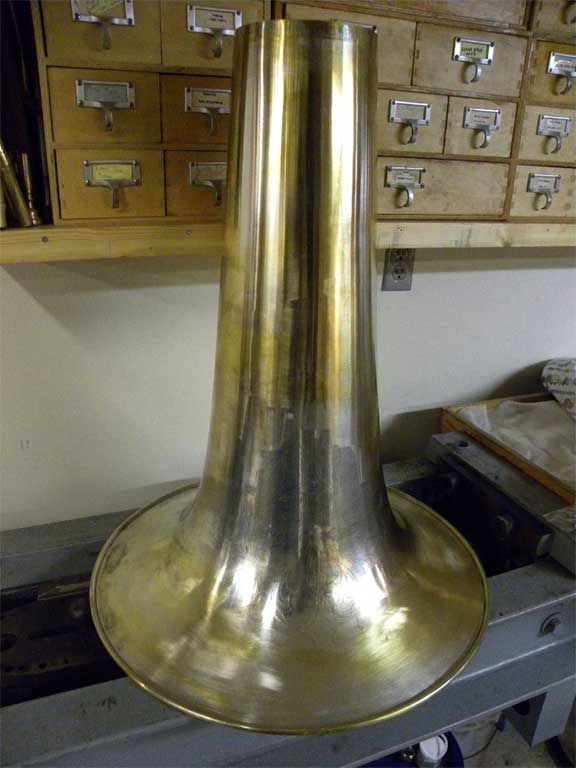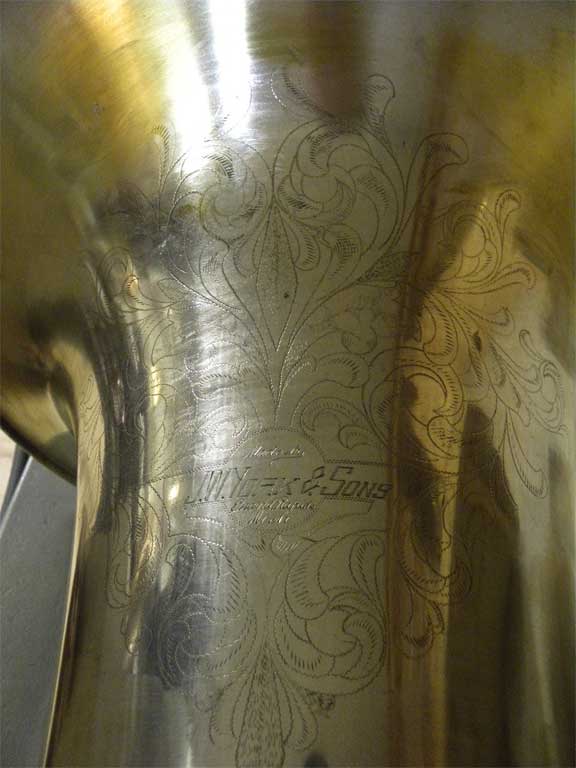I know this is probably more of "superstitious" non-sensical thought, but does replating an older Holton (or York, King, etc.) Monster bell have any affect on the sound characteristics of it?
Honestly, I'm sure it doesn't but I'm checking to see if anyone has done this to their older horns.
Thanks!
Re-plating a bell
-
UTSAtuba
- 3 valves

- Posts: 493
- Joined: Thu Oct 16, 2008 9:40 am
- Location: Brooklyn
- TheHatTuba
- 5 valves

- Posts: 1150
- Joined: Sat Nov 27, 2010 6:00 pm
- Location: Desert
Re: Re-plating a bell
If someone could give a quote for the cost as well, thatd be great
- Dan Schultz
- TubaTinker

- Posts: 10427
- Joined: Thu Mar 18, 2004 10:46 pm
- Location: Newburgh, Indiana
- Contact:
Re: Re-plating a bell
Aside from the obvious that bloke spoke about.... silver plating ain't what it used to be.
Dan Schultz
"The Village Tinker"
http://www.thevillagetinker.com" target="_blank
Current 'stable'... Rudolf Meinl 5/4, Marzan (by Willson) euph, King 2341, Alphorn, and other strange stuff.
"The Village Tinker"
http://www.thevillagetinker.com" target="_blank
Current 'stable'... Rudolf Meinl 5/4, Marzan (by Willson) euph, King 2341, Alphorn, and other strange stuff.
-
SousaSaver
- 5 valves

- Posts: 1133
- Joined: Sat Jun 26, 2010 5:19 pm
Re: Re-plating a bell
Aye. The trouble with quoting you a price on replating a bell is that the price of silver changes every day and depending on the size of your bell and the preparation required to plate the bell, following Bloke's sagely advice of NOT BUFFING THE SNOT OUT OF IT OR REMOVING MATERIAL UNNECESSARILY would allow too many variables to give you an accurate quote without seeing the bell IN PERSON. Pictures won't cut it in this sort of deal.TubaTinker wrote:Aside from the obvious that bloke spoke about.... silver plating ain't what it used to be.
As always, Bloke is right about this stuff.
- Daniel C. Oberloh
- pro musician

- Posts: 547
- Joined: Fri Mar 19, 2004 9:22 pm
- Location: Seattle Washington
Re: Re-plating a bell
As Joe touched on, overworking a badly beat up bell can have a pretty serious impact on it by weakening its integrady and distorting its shape so much as to change its sound in some way, what that might be is anybodies guess. It can also end up looking like crap. The best way to avoid such pitfalls is to use the right tools and do the work with a bit of care. It also helps to know what you are doing. There are many ways to get around the issues of pitting and scratches, this includes a good deal of hand sanding, multi-stage polishing and in some rare cases, acid-copper build up prior to silver plate. Most methods are time consuming if you want the final outcome to be decent. Sadly, few shops are interested in taking such projects on. And many in the trade do not know how to properly polish brass instruments. Their is a lot more involved in removing pits and scratches then rubbing them against a polishing wheel and buffing the S**t out of them. I myself, rarely acid-copper plate branches and bows and have only applied the process to a few bells.

I have included a few pics of a J.W. York bell that is part of one of my current big projects. It was badly damaged and heavily scratched and pitted. It has received a good deal of work so far and has more to be done. You will notice that the engraving is still quite intact.

Mr. Schultz mentions plating is not as heavy as it once was. This is true (in most cases) when we are talking about band instruments. My experience with plating tubas (I have a fair amount of it) is that ASP puts a good deal of silver on tubas as a matter of course. I have tried other sources and was unimpressed. Smaller instruments that I have plated, will almost always be double silver plate. It adds to the cost of a job but not that much. Complete tuba plate jobs are plenty thick. Double plate under normal use, will last decades, if done correctly. If you want to just plate a tuba bell, go with double plating but make sure you build into your budget the funds to have the dent work and finishing done by a pro. If all goes as it should, the bell will look good and sound as its design would dictate. Anyway, just thought I would add a little to the discussion.
Daniel C. Oberloh
Oberloh Woodwind and Brass Works
http://www.oberloh.com

I have included a few pics of a J.W. York bell that is part of one of my current big projects. It was badly damaged and heavily scratched and pitted. It has received a good deal of work so far and has more to be done. You will notice that the engraving is still quite intact.

Mr. Schultz mentions plating is not as heavy as it once was. This is true (in most cases) when we are talking about band instruments. My experience with plating tubas (I have a fair amount of it) is that ASP puts a good deal of silver on tubas as a matter of course. I have tried other sources and was unimpressed. Smaller instruments that I have plated, will almost always be double silver plate. It adds to the cost of a job but not that much. Complete tuba plate jobs are plenty thick. Double plate under normal use, will last decades, if done correctly. If you want to just plate a tuba bell, go with double plating but make sure you build into your budget the funds to have the dent work and finishing done by a pro. If all goes as it should, the bell will look good and sound as its design would dictate. Anyway, just thought I would add a little to the discussion.
Daniel C. Oberloh
Oberloh Woodwind and Brass Works
http://www.oberloh.com
-
SousaSaver
- 5 valves

- Posts: 1133
- Joined: Sat Jun 26, 2010 5:19 pm
Re: Re-plating a bell
Dan Oberloh is a genius. No snarky jokes here, just humble observance. I hope that if I keep practicing I will become as good as he is.
-
SousaSaver
- 5 valves

- Posts: 1133
- Joined: Sat Jun 26, 2010 5:19 pm
Re: Re-plating a bell
That is a good philosophy. I agree.bloke wrote:
Getting back on topic, I'm not so eager to make tuba (or sousaphone) bells appear as if they have never been scratched, nicked, or gouged. I can do a nice job of repairing them, but they are what they are.